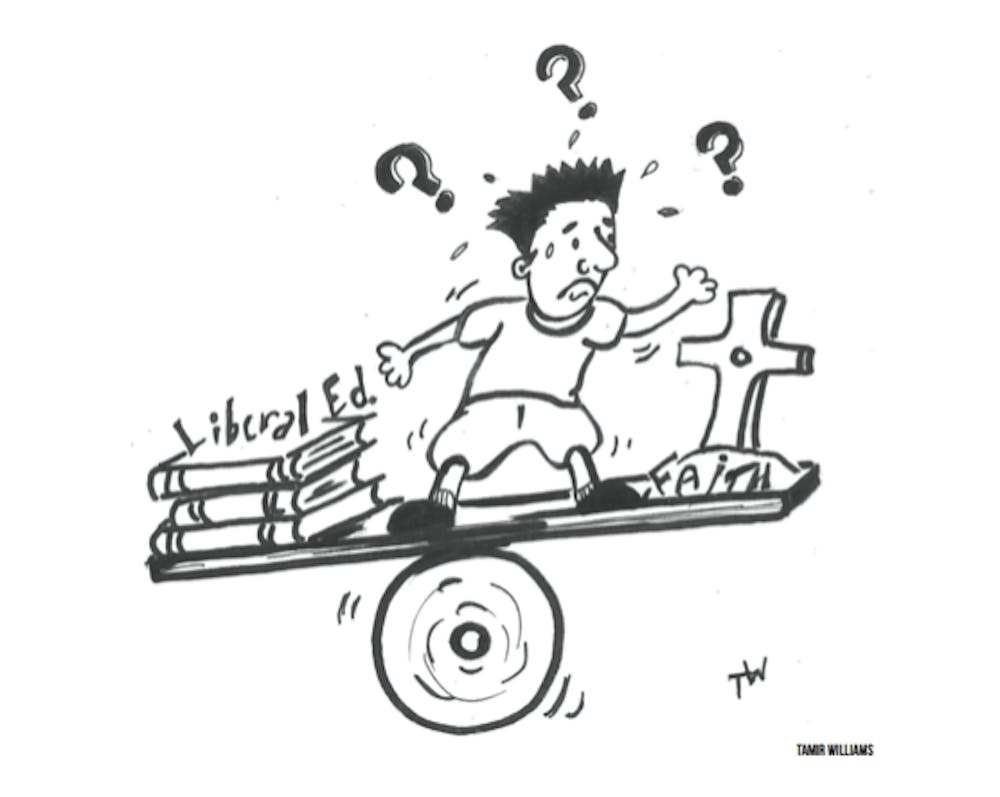I am sure that many of you, like me, fall into certain familial rituals after spending a few days back home on break. Laundry is done in collective family-sized loads, your normal dinner schedule is thrown horribly out of sync or perhaps you must perpetually update your parents as to your whereabouts, even if you are just running out to the corner store. Yes, all the old familiar childhood traditions come flooding back no matter how old you are. As good and grateful children, I am sure we all go along with the rules of the house. Well, at least some of them.
I was raised Catholic, and everyone in my family is a practicing Catholic. Back in Sicily, the old country, we have found the Catholic Church where our great-grandparents knelt and prayed. We are of that unique old breed that blends culture and religious tradition into a humorous and often comforting way of life. Our Christmas Eves are filled with seven different types of fish (don’t ask me why) and our Easters always feature enough lamb to feed a family twice the size of ours. Certain cookies are made at certain types of the year for certain festivals and feast days and I am sure it all seems very quaint. The cultural Catholic overtones in my family were present for a solid eighteen years of my life, and I never much questioned the process, from baptism to communion to confirmation. Yet, I was not surprised in the least to look back at my two years in college and find I have never once gone to Mass of my own accord. Meanwhile the Sunday morning ritual of Mass in my home has become remarkably more difficult to justify, even if only to please my mother.
What precipitated my spiritual deterioration? Was I never really spiritual to begin with? Was it all just pomp and circumstance associated with familial custom? We all adjust ourselves to the newfound freedoms of college in some manner or another, yet shouldn’t faith be a source of comfort and stability in a new environment? Now to be fair, I still call myself Catholic and probably will continue identifying that way. I just don’t go to Mass. It still counts though, right? In fact, the more and more I reflect critically on my faith I find I have little issue with much of what Jesus Christ said and moreover find myself spiritually moved by reading passages in the Bible. The actual going to Church seems to be the problem
I will never make the claim that liberal education leads students to atheism or agnosticism. It does, however, nurture a deep sense of critical and analytic interpretation in us. This is not held to the books, articles or journals we experience in the classroom but is employed in everything we interact with like media, art or human opinion. My faith is not exempt from critical interpretation, nor should it be. My issue with Catholicism is not that I do not find it to be spiritually motivating; it is that I am asked to put aside my own powers of interpretation in favor of a priest’s. As a man of faith, I seem to be relegated to listener instead of active participant. At times this is not an issue. I have heard Jesuits and incredibly intelligent priests make connections in Biblical text that I would not otherwise have made. I find it more difficult to sit through an hour of Church when I am asked to listen to a point of view and consider it, while giving no response.
My liberal education seems to get me in trouble in my perfect world, though it should not. As I am sure many of you have seen in the news, Pope Francis has made quite a stir in renewing a community and poverty focus in the Catholic Church. He inspires me and makes me want to revisit and re-experience my faith. Pope Francis, though, has shown that he is capable of interpreting doctrine differently than what was once set in stone, has combatted some of the more hierarchical extravagances of the Vatican. He presents a reinvented version of Catholicism the world sorely needs, a Church focused on service, moderation and dedication to fighting poverty.
My faith is not perfect; there is a laundry list of issues and political stances I, and many others, are quick to identify as wrong. Gay marriage, abstinence and women’s rights are all things that are in dire need of improvement. I would like to not let these things discount my faith project as a whole. My hope is that a liberal education can amplify my faith, and allow me to seek and discover why I actually consider myself a Catholic, rather than just considering it a cultural identity.
Artwork by TAMIR WILLIAMS



